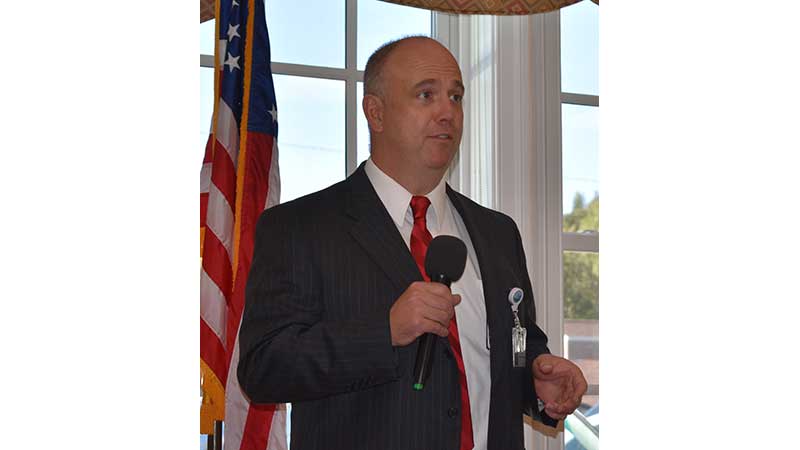Centra talks progress
Published 2:21 pm Wednesday, October 24, 2018

- Tom Angelo, CEO of Centra Southside Community Hospital, spoke about the changes the hospital has undergone and needs for improvement. (Photo by Emily Hollingsworth)
Those who attended the Centra Town Hall Friday were encouraged to express concerns and commendations about Centra Health, based in Lynchburg, and Centra Southside Community Hospital, Centra Medical Group and Centra PACE.
The town hall took place at 11:30 a.m. Friday at The Woodland. Participants primarily consisted of Centra representatives and members of the public.
Michael Elliott, interim CEO of Centra Health, spoke and said the town hall meeting was expected to be one of numerous meetings to get input from the community about the hospital’s operations and how Centra will seek to correct concerns and build an excellent medical center close to home.
Elliott, since former CEO E.W. Tibbs resigned late September, said he gets asked questions about whether he is overwhelmed with the new responsibilities.
“I can honestly tell them: absolutely not,” Elliott said, who said he oversees approximately 8,500 employees.
“We don’t do anything individually,” Elliott said. “We do things together.”
He said the goal Centra has going forward is to focus on team engagement, making sure that each employee is cared for, and making sure that each patient gets an excellent experience.
“If I have any soapbox to get on, it’s about taking care of ourselves and one another,” Elliott said.
“It’s not just enough for me to prescribe you medication, what’s important is for me to … understand how you’re doing personally,” Elliott said. “We’re not just here to prescribe medication, we’re here to take care of you and your family as an individual.”
Centra Southside Community Hospital CEO Tom Angelo provided information about the hospital, and Angelo and Elliott accepted questions from the audience.
Participants brought up issues they have had at both the hospital and Centra Medical Group that include long wait times; having little interactions with the doctors, appointments that last between 5-10 minutes; miscommunications between health providers and pharmacies; issues with the digital patient record system; health providers who appear uncaring or too busy to see patients, and doctors and health providers who stay a short time, and then leave.
Participants who expressed concerning experiences at Centra were directed to Donna Harber, director of operations, who recorded the situations.
Angelo gave background of the hospital prior to what he described as its partnership with Centra. He said the hospital was in dire straits, having challenges with infrastructure that had not been kept up and finances.
“We were fortunate enough to affiliate with Centra Health in January of 2006, and we didn’t know what that would look like then,” Angelo said. “I wasn’t here then, I did not come until 2007. Bill Bass was a big part of that transition and affiliation.”
He said Centra gave millions of dollars into hospital and community.
“It’s the best decision we ever made,” Angelo said.
Angelo said while the hospital has accomplished a lot, he said they had hired providers that they should not have, nor provided the services needed to accommodate the community.
Angelo said Centra is the only health provider for 52 miles.
He said the hospital has become more selective, looking only for specialists with solid reputations. Angelo said because of this fact, they had the opportunity to replace a urologist at the hospital, but chose to continue looking. He said the hospital has not had a urologist for four years, but plan to have one next September.
He said the hospital has also hired pediatricians.
Angelo said emergency room (ER) wait times have been an issue. He said in 2004, there were approximately 18,000 visits annually. In 2015, there were approximately 37,000 visits. He said that caused serious backups in the appointments people can receive from health care providers.
“If patients wait more than three hours in the emergency room, they are incredibly unhappy, and we know that because we have data that shows that,” Angelo said. “If it’s less than three hours, they are incredibly happy. And so we have to do a better job.”
So he said the hospital developed a plan: to convert the 52,000 square-foot building on South Main Street in Farmville that had originally been a Roses store and build a medical center, which is currently Centra Medical Group.
Angelo said the goal was to divert some of the patients who went to the ER, citing that approximately 45 percent of patients were appropriate for primary care.
Angelo said on the first week the medical group office opened, 10-15 patients walked in. The number ballooned to 40 the second week, and it’s averaged about 60-100 visits.
Angelo said not only did the medical group do nothing to reduce the ER volumes, but the medical center has experienced similar challenges for appointment and wait times. He said Centra’s goal is for someone to get an appointment within two weeks, and it’s currently at two months.
Addressing concerns from audience members who said medical representatives could not access their digital records, Elliott and Angelo said the hospital, on Sept. 1, converged all of its digital records systems into one, called Cerner Millennium, where it had originally been split into seven or more systems. We were on more than seven systems, and we just converged it into one. Taking disparate electronic medical records and bringing them into one system. Some of the inefficiencies that you have experienced in the past … grew as an organization over the decade. Use your system, interface it with our system. It got to be too much.
“I will never stand in front of you and tell you that we’re perfect, but I promise you we will be working toward that,” Angelo said.




